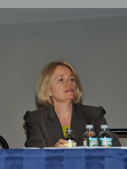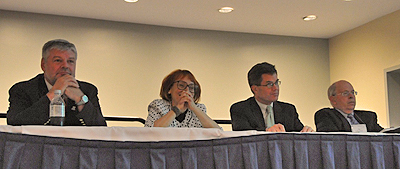

Drs.Marlene Maheu, Stephen DeMers, Dena Puskin, Joseph McMenamin, & Patrick DeLeon
American Psychological Association
119th Annual Convention
Washington D.C., August 4-7 2011


| Basic Facts About Licensure |
|---|
* Professions are regulated by the States * There is no 'national' License * Most laws have transitioned from title to practice acts "You can NOT do the things described as being within the purview of a profession." - unless you are licensed to practice that profession. If someone says they are a “life coach” but is providing psychological services, they are practicing psychology, "whether they call themselves a psychologist or not." "LICENSING LAWS ARE DESIGNED TO PROTECT THE PUBLIC, NOT THE PROFESSION" |
What is License Portabilty?
A system that extends the privilege to practice a health profession in multiple states through agreements that recognize individual state and territorial jurisdiction while facilitating a process for obtaining and maintaining licenses in multiple jurisdictions.